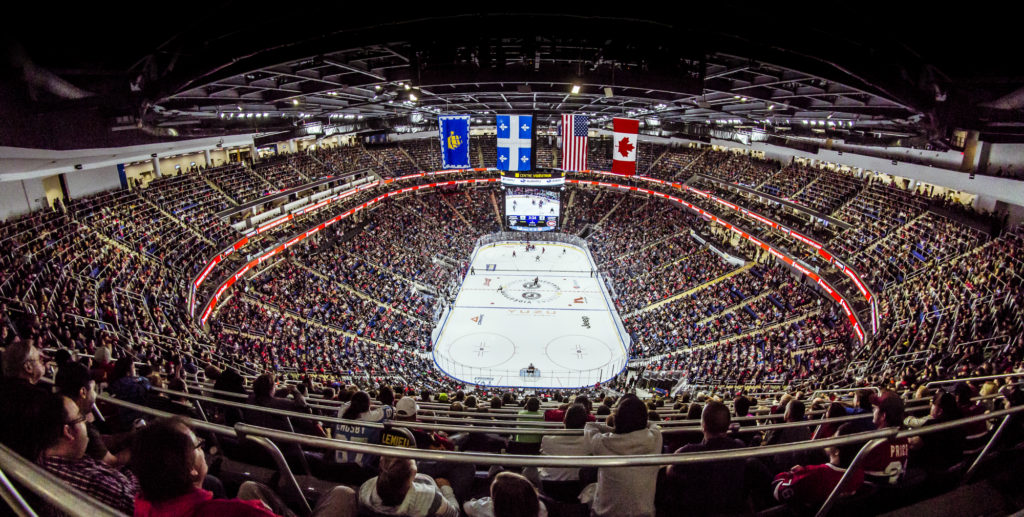Even with the league’s recent announcement of a Seattle expansion team, much remains to be determined about the future slate of the NHL. Several of the league’s current teams are dealing with arena situations that are in flux, while a handful of cities appear to be building their cases as potential future NHL markets.
One arena situation that is very much in question right now is that of the Ottawa Senators. Owner Eugene Melnyk has been leading a LeBreton Flats redevelopment proposal anchored by a new arena, but that project has hit a major uncertainty now that Melnyk has filed a lawsuit that includes business partner John Ruddy as one of its defendants. The Senators have also not had much success in terms of revenue or attendance at their current home, the Canadian Tire Centre in suburban Kanata, so a new arena has been viewed as a possible boost to their fortunes.
Another club with an uncertain arena situation is the Arizona Coyotes. The Coyotes have long expressed their displeasure with Gila River Arena in Glendale and have sought a replacement in downtown Phoenix or East Valley. A new arena in one of those locations has been pitched as a potential economic jolt for the club, but there has been no appetite for public financing among elected leaders, leaving questions about how the Coyotes will look to fund the facility. Furthermore, the Phoenix Suns’ ongoing push for potential Talking Stick Resort Arena renovations could all but rule out a new shared NBA-NHL arena somewhere in the Phoenix area.
Recent reports have indicated that Coyotes owner Andrew Barroway is looking for a new partner. Barroway has expressed desire previously to avoid relocation by building a new arena in Phoenix or the East Valley, but obtaining another investor is likely going to be a key hurdle in making the financing for a new arena work.
Keep in mind that, while the Coyotes and Senators are battling uncertain arena situations, relocation is not necessarily the next best option for either club. Melnyk could salvage the arena proposal in Ottawa, or another plan could surface down the road that assures the club’s future in Ottawa. (In fact, another group interested in LeBreton Flats has indicated it could include an NHL arena in its plans.) It is also possible that, after years of being perhaps the most-speculated relocation candidate in the league, the Coyotes find a viable solution in the competitive Phoenix sports market.
That being said, there are still a few cities that could make a play for the NHL and would have to look at relocation options in the event that the league makes no near-term plans to expand beyond 32 teams. Future expansion is not necessarily a remote possibility but, with only the NFL matching that total among major North American sports leagues, it could be a number that the league is content with for the foreseeable future.
One such candidate is Quebec City, a former expansion favorite that had its bid deferred in 2016 amidst concerns over the NHL’s geographical imbalance and a weakening Canadian dollar. Quebec City would be a small market by NHL standards, but it also has a modern arena in the Videotron Centre (above) and a willing ownership group in Quebecor. Furthermore, it is also a passionate hockey town—with plenty of nostalgia for the Nordiques and an NHL-ready arena, perhaps Quebec City could be similar to Winnipeg in that emerges as a viable NHL home despite its relatively small size.
Within the United States, the most intriguing market without an NHL franchise might be Houston. It is the largest city in either the United States or Canada without an NHL squad, and the downtown Toyota Center could be modified to accommodate hockey. In fact, that possibility has become increasingly speculated now that the NBA’s Rockets are under the ownership of Tilman Fertitta—who has publicly expressed a desire to see an NHL team at Toyota Center.
Houston does have a somewhat fraught history with professional hockey, however, and it would remain to be seen if an NHL team could reverse that trend. The list of clubs that have come and gone from Houston over the years includes the AHL’s Aeros, who played at Toyota Center before moving to Des Moines in 2013 amidst lease issues.
The presence of viable arenas and potential support makes Quebec City and Houston the strongest markets in the mix, but there could be a few others. Portland’s Moda Center could be upgraded to accommodate NHL and the thought of a future Portland-Seattle-Vancouver trio could help build support, though no firm efforts to bring the league there have emerged. San Diego, meanwhile, has a very successful AHL squad in the Gulls and a void in its major professional sports scene with the loss of the NFL’s Chargers. However, it would need to replace the aging Pechanga Arena San Diego in order to land the NHL, and the city’s reluctance to fund an NFL stadium could carry over to any new arena discussions. There is also plenty of speculation about Kansas City’s Sprint Center eventually landing a team, but the downtown venue has been a success without a major sports tenant and there are no signs to this point that a potential ownership group will emerge.
There are also a few other NHL teams often speculated as relocation candidates, but that might not be tangible options for now. The Carolina Hurricanes appear willing to make a go of it at Raleigh’s PNC Arena after Tom Dundon purchased majority ownership in the club, while the Florida Panthers ownership has not shown any concrete interest in relocating.
Image courtesy Videotron Centre.
This article originally appeared in the weekly Arena Digest newsletter. Are you a subscriber? Click here to sign up for the free weekly newsletter


